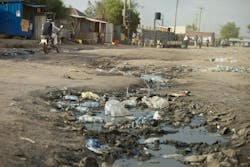Millions at risk from cholera due to lack of clean water, soap and toilets, and shortage of cholera vaccine
Immediate action is needed to stem an unprecedented multi-year upsurge in cholera cases worldwide, according to the International Coordinating Group (ICG) on Vaccine Provision.
Actions include investing in access to safe water, sanitation and hygiene, testing and detecting outbreaks quickly, improving quality of and access to healthcare, and fast-tracking additional production of affordable oral cholera vaccine (OCV) doses to better prevent cases.
Cholera has been surging globally since 2021, with the 473,000 cases reported to WHO in 2022, more than double those reported in 2021. Preliminary data for 2023 reveal further increases, with over 700,000 cases reported. Several of the outbreaks have high case fatality rates, exceeding the 1% threshold used as an indicator for early and adequate treatment of cholera patients. These trends are tragic given that cholera is a preventable and treatable disease and that cases had been declining in previous years.
Currently, the most severely impacted countries include the Democratic Republic of the Congo, Ethiopia, Haiti, Somalia, Sudan, Syria, Zambia, and Zimbabwe.
Members of the ICG call on currently and potentially affected countries to take urgent steps to ensure their populations have access to clean water, hygiene and sanitation services, and the information critical to prevent cholera’s spread. The establishment of these services requires political will and investment at the country level. This includes creating capacity for early detection and response, enhanced disease detection, rapid access to treatment and care, and working closely with communities, including on risk communication and community engagement.
The severe gap in the number of available vaccine doses, compared with the level of current need, puts unprecedented pressure on the global stockpile of vaccines. Between 2021 and 2023, more doses were requested for outbreak response than the entire previous decade.
In October 2022, the ongoing vaccine shortage necessitated the ICG to recommend a single vaccine dose, down from a previous, long-standing two-dose regimen. Approximately 36 million doses were produced last year, while 14 affected countries registered a need for 72 million doses for a one-dose reactive strategy. These requests understate the true need. Preventive vaccination campaigns have had to be delayed to preserve doses for emergency outbreak control efforts, creating a vicious cycle.
Global production capacity in 2024 is forecast to be 37-50 million doses but will likely continue to be inadequate to serve the needs of millions of people directly affected by cholera.

